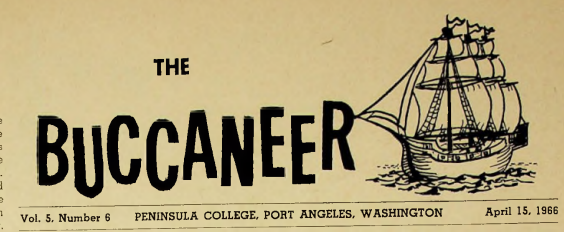
PC Fisheries Course Only One of Kind
Peninsula Colelge offers the
only fisheries technology course
of its kind in the country. This
two-year course, set up in the
fall of 1964, is instructed by Mr.
Robert Mausolf and Mr. Donald
Wells. Mr. Mausolf became
head of the department when
the program began, and Mr.
Wells joined the P.C. staff earlier this year.
At present, there are 28 students enrolled in the class—11
freshmen and 17 sophomores.
The purpose of the course is
to prepare the young men for
the job opportunities the state
fisheries departments offer.
There is need for non-managemenl employes and biologists,
and with the training this program offers, the young men
will have positions awaiting
them upon completion of the
course.
Several of last year’s students
who were hired last summer to
work for the State Fisheries Department, were commended on
their fine work by department
heads.
Among their many projects,
the students have constructed
their own fish hatchery and
“holding pond”, which are located on White Creek behind
the college campus. The fish
will be kept in the hatchery until they are almost two inches
long. They will then be placed
in the pond. According to Mr.
Mausolf, the 80,000 silver
salmon eggs are ready to hatch.
The students are also tagging
perch as part of their project.
This way it will be possible for
them to keep track of the history of the fish they mark.
As a future project, the fisheries department will construct
their own building on campus,
where classroom sessions will
be held.
WRA Takes 4th in State
The Peninsula College WRA
took fourth place in the basketball tournament held at Western Washington State College
in Bellingham on March 4 and
- Peninsula was one of 12
teams participating in B-league
competition.
Although the girls lost their
first game on Friday afternoon
to Seattle University, they won
two games on Saturday. In the
morning, they beat Olympia
Junior College 43-14, and in the
afternoon, they beat the University of Puget Sound 23-15.
Karen Kettel contributed the
highest number of points during
the three games with a total of - Other players contributing
a large number of points were
Beverly and Sharon Smith who
each contributed 23 points.
The starting line-up for the
team consisted of: Maggie Bean,
Captain; Karen Kettel; Mary
Pfaff; Mary Kautz; Sharon
Smith; and Beverly Smith. The
other team members were:
Peggy Lancaster, Betty Elder,
Jean Hordyk, and Kristi Morrish.
Taking fourth place was a real
thrill to the team because they
had practiced together only 11
times.
Saturday morning at breakfast, Miss Gala promised dessert to the team if they could
beat Olympia Junior College.
One of the team members asked what she would do if they
won their third game Saturday
afternoon against the University of Puget Sound, and she
promised to buy steak for the
entire team.
Miss Gala provided the dessert Saturday evening when the
team stopped for dinner.
The team got their steak dinner on March 21, when they
had a picnic at Whiskey Creek
Beach.
Every Woman Student of Peninsula College is eligible to be
a member of the Women’s Recreational Association. The WRA
is an organization which strives
to provide enjoyable activities
for Peninsula’s women students.
New sports are organized
each quarter so that a student
may become involved at any
time during the school year.
Miss Gala hopes to organize
three or four sports for the WRA
this spring quarter. Volleyball,
tennis, and softball may be included.
Spring Quarter Marks Progress
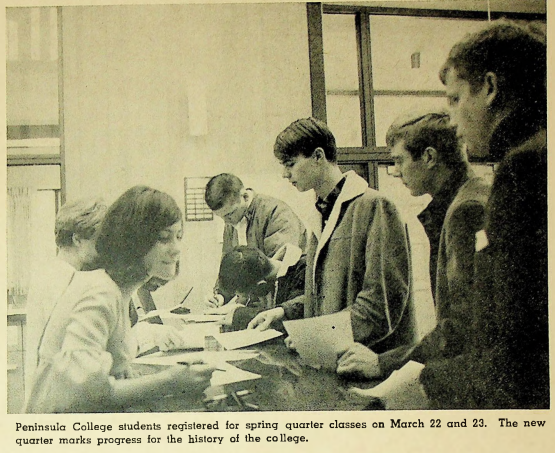
Undoubtedly many students
do not realize that over a period of six short years, Peninsula
College has emerged from a
dream to a reality. We, the
students and faculty members
ot P.C., are helping to make this
school the fine institution it was
set up to be.
With the opening of spring
quarter, 1966, one can easily
see that dramatic changes have
taken place at Peninsula College since her doors first opened for enrollment in September,1961 At that time, 218 students
were enrolled in the college,
and a faculty of 13 teachers
instructed the students.
In 1961, Peninsula College
was located next to the high
school, and classes were held
in one small building. For the
first year or two, this arrangement was adequate. However,
as the years progressed, the enrollment expanded as did the
space required to house the
students, and conditions at the
old college site became too
crowded.
Talk of constructing a new
campus began in 1962. The
planning and effort by the Port
Angeles School Board and interested citizens met with gratifying success at the November
6, 1962 election when the people of Port Angeles voted overwhelmingly in favor of an enlarged college to alleviate the
crowded conditions at the old
college location.
That same year, fall quarter
enrollment at the college was
287, which, in comparisson with
other schools of the same size
and capacity, was a large increase in the enrollment.
Beginning January, 1963, Peninsula College offered a Practical Nursing course. Since the
college did not have space
available for the classes, it was
necessary to redecorate and remodel some rooms on the third
floor of the YMCA building for
class sessions.
Construction of the new campus was to begin, and on May
25, 1964, a ground-breaking ceremony was held at the site of
the new Peninsula College campus, where we are presently
located.
In February, 1965, students
and faculty alike picked up
their desks and books and
moved into the buildings.
Not only has Peninsula grown
in enrollment and physical
size but today offers a wider
variety of classes than ever before. In addition to the Practical Nursing course that has
been added to the college curriculum, a special two-year
fisheries program has been set
up as another vocational course.
A secretarial vocational program under the direction of Mr.
Thayer has also been added.
Every quarter several new
courses are added to the regular schedule of classes offered
by the college.
Today, more than 450 daytime students are enrolled at
Peninsula College. The faculty
consists of thirty able instructors, and students are enjoying
the comforts of new and modern
facilities.
The college is equipped with
spacious class rooms, fine laboratories, a beautifully modern
and well – equipped library,
which makes studying conditions for the students pleasant.
If these last few years’ increase in enrollment is an example of what is to come in the
future, even more and larger
facilities will be needed to accommodate the young men and
women of tomorrow. As all
records so far reveal, Peninsula
is growing in the right direction
toward a truly fine institution.
Boeing Program To Be Offered
Peninsula College will be participating in the Boeing Company’s program for training
new draftsmen, this summer.
The eight week training periods
will start in June, offering scholarships to qualified students,
with an interest in drafting.
The training is being offered
through the Washington State
Employment Security Office for
all students with a high school
education and with adequate
interest and desire to attend 40
hours of classes per week. It
was originally scheduled to
start in April, but a lack of applicants has moved the date
up to June. Participating students will be going to classes
between 5:30 p.m. .and midnight, Monday through Friday,
and on Saturday, between 9:00
p.m. and 5:00 p.m. Guaranteed employment in the Seattle
area will be open to graduates
of the program.
An additional course in General Office Practice will be
available at the Peninsula College under the Manpower Development and Training Act, beginning April 11, and lasting 52
weeks, Monday through Friday.
Under the regulations of the
program for new draftsmen, tuition will be a part of the scholarship, and training and subsistence allowances will be provided when needed.
Dr. Podet Speaks at PC
Dr. Allen H. Podet of Temple
Sinai in Bellevue, Washington,
represented the Jewish . Chautauqua Society as lecturer at
Peninsula College in Port Angeles on Wednesday, April 13.
The rabbi spoke at assembly in
the library on the subject “What
10:00 a.m. in the college liChristianity and Judaism Have
in Common.”
A spiritual leader of the Temple Sinai, Rabbi Podet previously served congregations in Dayton, Ohio; Petersburg, Virginia;
Casper, Wyoming; Portsmouth,
Ohio; and Mattoon, Illinois.
After receiving his B.A. degree from the University of Illinois in 1956, Rabbi Podet was
ordained at the Hebrew Union
College Jewish Institute of Religion in Cincinnati in 1962, and
he received his M.A. degree in
Hebrew Leiters.
The rabbi lectures on college
campuses under the auspices
of the Jewish Chautauqua Society, an organization which
creates better understanding of
Jews and Judaism through education.

Special Award Banquet Is Held
A new tradition was inaugurated Monday night as the Peninsula College Athletic Department held the first Special
Awards Banquet. Honored at
the banquet held at Birney’s
was the 1965-66 Peninsula basketball squad and staff.
Peninsula Pirates recognized
for outstanding achievement
during the season were: Dave
Denny (Inspirational Award and
Honorary Captain); Dan Green
(Coach’s Sweepstake); and Carl
Keeler, team manager (Outstanding Service Award). All
received trophies.
Winning their black and gold
letter jackets were sophomores
Dave Denny, Dan Peacock, and
Ray Berg. Freshmen winners
were Jim Ward, Pat Digby, Tom
Lyons, “Sonny” Sacapanio, Dan
Green, Bruce Shamp, Art Bell,
Gary Haakenson, and Norm
Carson.
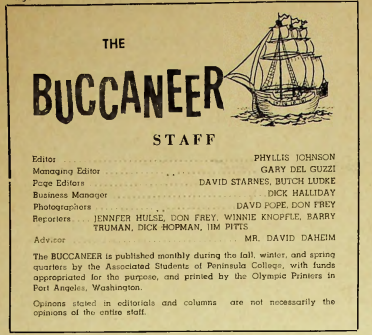
Editorial:Danger- Signs of Spring Fever Ahead
“Most the year has passed away—
Spring has come at last!
Guess I’ll throw those books away,
Sit back and take a rest.”
Those words, spoken by an important college student (yours
truly, thank you; I just made them up), describe the feeling that
so easily overtakes us during spring quarter.
Indeed, there is no quarter like spring quarter! The year is
so near to its finish, and vivid pictures of vacation-bound students
bounce through our little minds. How difficult it is to keep our
noses poked in textbooks when we could so easily be outdoors
enjoying the sunshine Mother Nature bestows upon us during this
fine season of the year.
The bright sunshine, the cloudless sky, and nature’s delicate
blossoms will all torture us as we walk into those dark classrooms
each day.
A quick little spin out to a most scenic Lake Crescent seems
inviting—especially during those lecture periods. And the view
from Hurricane Ridge: how spectacular it is on a clear spring day.
Or perhaps a day at the beach would be more appealing?
What we need now, students, is a big push—to move aside
those temptations of cutting class. We need to buckle down and
study like mad and to make the most of the class days left, for in
eight short weeks we, too, shall be as free as little birds, only
equipped with another year’s worth of knowledge which we shall
always possess.

Book Review: The Clown
By JULIE HOFFMAN
Hans Schnier, the main character in Heinrich Boll’s The
Clown, is not supposed to be a
hero. He is supposed to be a
bum. Hans Schnier is a oncegreat clown who has slipped
from the top of the performing
ladder after suffering the loss
of Marie Derkum, the woman
he lives with and loves. His
decline alienates him from his
family, wealthy mine owners.
He has no one left. Alone in
his apartment with a bottle of
cognac, he begins to telephone
everyone he knows to escape
from loneliness and, incidentally, to get money to live on.
Out of all these people, he can
bring himself to ask only his
brother and his father. He gets
six marks (about $1.50) from his
brother and nothing from his father. The story is simple enough, but, instead of feeling pity or scorn for the clown, one feels empathy for him and disgusted only with the pretty, petty banalilies of the world around him.
One feels that he is the only
“real” person in the story, the
only one without artifice, without some device to fool himself
into thinking he is good.
The social criticism presented
by the clown is valid, but it is
the searing humanity of such
a figure as Hans Schnier that
calls attention to a hero in disguise. This clown is more sensitive, more honest, more realistically self-critical than any of
the good, righteous, proper people he lives in the midst of.
The book is wildly funny at
times, sensible and critical at
others, and yet underlying both
moods is the clown’s real sorrow in losing Maria, and knowing what he alone can know_
that he is still a great clown. He
alone can look into himself. He
is an artist.
One of the fascinating things
about The Clown is the number
ol snide asides pul in by Hans
cchmer. His comments on religion, love, family, loneliness
are so devastating to the facade
of society that it is surprising to
find them in fiction instead of
essays by Mencken or Shaw.
ISIS Puts Lid on Summer Jobs Abroad Program
Only 500 more young people
(171/2 to 40) from the U.S. and
Canada will be accepted for
participation in the 1966 Summer JOBS ABROAD program,
it was announced recently by
ISTC Executive Director Francis
X. Gordon, Jr.
ISIS (International Student Information Service, Brussels) and
ISTC (International Student
Travel Center, NYC) are nonprofit organizations devoted to
securing overseas jobs f o r
young people sincerely interested in expanding their horizons by working and living
abroad for a summer or longer.
The jobs available are similar to what you would find at
home during the summer. There
are nine basic work categories
ranging from Camp Counseling
and Construction to Child Care,
Office and Resort or Hotel work.
The countries traditionally in
demand are divided into four
language areas: English (Great
Britain and Denmark), French
(Belgium, France and Switzerland), German (Switzerland,
Austria and Germany), and other (Spain, Portugal, Italy, Japan,
Africa, etc.)
Naturally the customs and
living conditions abroad are different. The pay is lower and
the hours longer, but instead of
spending money traveling with
other American tourists, you
earn money side by side with
the local citizens. The cultural
and fun opportunities are unlimited. More than 35 participants from 1965 are going again
in 1966.
ISTC and ISIS are the only
two international organizations
which absolutely guarantee a
job abroad to accepted members. Some 6 months participants request and receive three
aifferent job assignments in
three different countries. In addition to securing the job,ISIS
and its North American affiliateISTC, provide a multitude of services to all members while they
work, travel and study abroad.
May 1st is the deadline for June
work applications.
For details write airmail (15
cents) to: ISIS, 133 rue Hotel des
Monnaies, Brussels 6, Belgium.
Bruno Concludes Two Year Stay at Peninsula College
By DICK HOPMAN
We frequently see students
from various foreign countries
on our campus and periodically
we interview them. This serves
the dual purpose of first introducing our visitor to the student
body, and secondly we catch
a glimpse of their country’s customs and practices while we in
turn get their opinion of ours.
For this particular interview
I had the pleasure of talking
with Bruno Kochansky. Bruno
is from the city of Coquimbo,
Chile, which is the major seaport of the province of Coquimbo. On the map this province
lies in the northern part of the
Republic between the provinces
of Atacama and Aconcagua.
The city of Coquimbo with a
population of 30,000 is almost
twice as large as Port Angeles,
but with its magnificent backdrop of mountains and its close
proximity to the water, Bruno
says that Port Angeles reminds
him of home. I asked jokingly
if the rather damp climate also
reminded him of home. Bruno
replied seriously that tire climate of Chile is much the same
as that of the Northwest.
This is Bruno’s sixth quarter
here at Peninsula College and
he says that he’s enjoying the
opportunity and appreciates all
the help that he’s received from
both the faculty and the students. For spring quarter
Bruno is taking economic geography, economy 210, chemistry,
and music. He’s looking forward to this coming quarter as
it is his last one here at the
college although he thinks he
may have to cut his wrists each
morning to drain the blood from
his eyes for that eight o’clock
class. Profound assurances
were given to the effect that Mr.
Maloney would certainly appreciate the sacrifice.
The goal of Bruno’s education
is to practice dentistry in the
United States. He has had some
experience in this line of work
in Seattle where he has worked
as a dental technician. During
that time he was responsible
for making casts, constructing
bridges and plates, and the
completion of mechanical restorations. Bruno says he prefers dentistry because he enjoys working with people, and
he likes to do detailed work
with his hands. Bruno also
mentioned that there are definite economic advantages in this
particular profession.
Beside his interest in dentistry Bruno has several hobbies which he enjoys. Among
these are skiing, skating, golf,
and he’s no slouch with a
bowling ball, having an aver
age of 170. One of Bruno’s less
strenuous pursuits is chess. Tim
Smith, one of our out-of-town
students, who came in third in
the California state chess tournament held in San Francisco,
will testify to Bruno’s prowess
in this intellectual game. Complete relaxation comes to Bruno
in the form of classical music,
particularly the work of the 17th
and 18lh century composers.
Preferences in this area include
George Frederick Handel,
Franz Joseph Haydn, Wolfgang
Mozart, Christoph Gluck, Ludwig von Beethoven, and that
giant of the organ who has done
for music what Luther did for
the Bible, Johann Sebastian
Bach. Bruno’s familiarity with
the composers indicates the
level of his taste which is obviously above average.
In inquiring about the Chilean
school system as compared to
purs, Bruno notes that there are
some minor differences. For
example in Chile the students
stay in the same class all day
while instructors for the various
subjects move from room to
room. Other interesting aspects include the fact that the
students attend school for eight
hours a day and for half a day
on Saturday. Their summer
vacation has a peculiar feature
that ours lacks … it begins
with Christmas. The Chilean
summer begins on December 21
and ends on the first of March.
Also Bruno thinks that it is
more difficult to attend college
here in America because students often have to hold down
full or part time jobs. In Chile
the parents are obligated to
put their children through school
for as long as they want to go,
hence there is no real necessity
for college students to work.
More time can be devoted to
school. There may be some
merit in this, by golly.
After this quarter Bruno is
looking forward to continuing
his education at the University
of Wqshinglon. However, there
are: two large problems confronting him. First of all, Chile
is in danger of going to war
with Argentina, and because he
is a reserve sergeant in the
Chilean army, they could call
him to active duty on short
notice. Second, he’s eligible to
be drafted by the United States
for active duty in Viet Nam.
We wish you the best of luck
and success in the future, Bruno.
You’ll be a valuable asset to
both the U. S. and its people in
your chosen career.
________
Attending the Special Awards Banquet Monday were E.John Maier, president of the college, Floyd Young, registrar, and Arthur Feiro, director of student athletics and activities. They were accompanied by their wives.
______________
Cheerleaders at Banquet
Pirate cheerleaders and pep-promotors attended the special awards banquet as special quests.
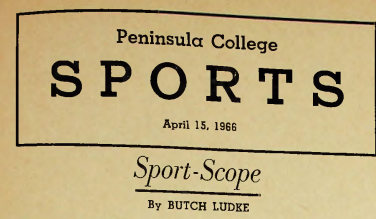
Gaseous Cassius Proves He’s Classiest
Toronto’s Maple Leal Gardens, final resting place for boxing’s
latest floating prize fight, was the site where gaseous Cassius Clay
proved that he is the classiest among modern heavyweights .
again. In post-fight interviews, Muhammed Ali as he prefers to
be known, insisted that he be given some credit, instead of criticism, for a change. I am inclined to agree.
Clay has been termed from “the most unpopular athlete in the
country”, to “the most hated man in the country”, to “the least
liked heavyweight champion of all time.” I wonder if people in
the United States are really giving the champion a fair shake. I
doubt if you’ll ever see a staunch defense of Clay in print again,
but you have to consider the man’s point of view.
First, what are the main criticisms of the champion? One—
he is a braggart and conceited; two—his membership in the Black
Muslims; and three—his recent comments on the United States’
role in Viet Nam. I wonder if these are enough to disallow the
champion of the world to defend his title in his own country.
Boxing is one sport in particular where extreme self-confidence is essential. Boxing buffs found Clay cute and uncanny
when he used to predict the round in which his victims would fall.
I say used to’ because lately Cassius has taken a more mature
approach to his fights, declining to predict an exact outcome. The
brash image he has outgrown was mainly for gate results anyway.
The Black Muslims are not a hate group, they are separatists.
Who’s to say they haven’t got the solution to racial conflicts?
They don’t smoke, drink or swear, and how many of us can say
that about ourselves? I’m not advocating membership in the
Black Muslims, but is it right that a man should be discriminated
against because of his religious preference?
Last, Clay has said he “had no quarrel with them Viet
Congs.” Again this is a result of his religion. The Muslims are
conscientious objectors and refuse to fight. I’m not saying this is
right either, but again it’s a person’s religious beliefs and
preferences.
Getting back to the Toronto fight, it appeared as though each
combatant followed his fight plans to the letter. Chuvalo went to
the body (a la Bob Fitzsimmons’ solar plexus punch win over Jim
Corbett in 1897 evidently) and Clay pounded away at the head.
The outcome only proves the old adage—it’s better to use the
head over the heart.
Devastators Capture Another One
The intramural Devastators,
unbeaten now in sixteen league
games this season, capped
their second title in a row with
a 58-55 defeat of their nearest
antagonists, the Crushers, to insure them the 1965-66 Peninsula
Intramural Trophy.
Mike Doherty1 paced t h e
Crushers in the finale with 20
points and Steve Counter added 14. Butch Ludke had 21
for the Devastators while Jeff
Anderson cashed in at the foul
line for 12 and Bob Jones hit
for 11. Following is the final
top ten leading scorers for the
season.

Selective Service Examinations
Three dates have been set
for giving the Selective Service
examinations: May 14, May 21,
and June 3. Applications to
take the test are available at
the local Selective Service office. If you desire to take the test, the application should be completed and mailed prior to April 23, 1966. The tests will
be given in Tacoma, Seattle, and Bremerton. Additional information may be obtained from the Registrar, Mr. Young.
Basketball out, Baseball In at PC
The 1966 Peninsula College
baseball team evidently would
do very well against high school
competition, but may find the
junior college brand of ball
pretty hard to handle.
The Pirates opened the season with a 3-2 decision over
Port Angeles High School, one
of the stronger ball clubs
around, but have since dropped
four to junior college opposition, all to the powerful Olympic College Rangers of Bremerton.
Pitching and defense need
strengthening if the Pirates are
to make a showing in the tough
junior college circuit this spring.
Teams from Lower Columbia,
Clark, Centralia and Grays Harbor, along with Peninsula, comprise the Western Division of
the State Junior College League.
Pirate head coach Bill Quenette has found three hurlers, all
of whom have found the going
pretty rough at times. Ray Berg
is the moundsman mainstay, as
he was for last year’s Pirates,
and has found help from Tom
Lyons and Roger Taylor. Lyons
played ball at Blanchet in Seattle and Taylor threw for Port
Townsend the last couple of
years.
One bright spot in the Pirate
picture has been the hitting.
The Pirates have not been outhit badly in any game, and
have in fact out-hit the opposition most of the time. Ed Bedford is currently on a rampage
with a .533 mark with eight hits
in fifteen trips. Butch Ludke is
second with .375 with six hits
in sixteen trips.
The Pirates have been resigned to turn out on Franklin
School’s Little League field
whenever the Roughriders are
turning out on Civic Field. They
were scheduled to meet the Riders in a return game last Tuesday. Grays Harbor invades
Civic Field for a double-header,
the first league action, this Saturday and it should be a good
test and indicator for the Pirates
for the remainder of the baseball campaign.
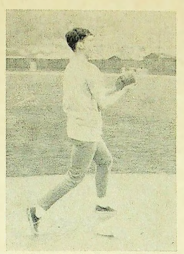
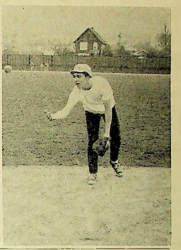

Tom Lyons gets flip from
Butch Ludke in the Peninsula
pre-game turn-out. The Pirates went on to down Port
Angeles Roughriders 3-2 the
next day, but have found
rocky going since. Next—
Gray’s Harbor, Saturday, at
Civic Field.
Pirates Finish Season 5th in Western Div.
That’s one way of saying it.
Another way is to say that the
Pirates held up the bottom of
the Western Division of the
State Community Junior College League for the second year
in a row.
The season was not without
its share of records though.
Bill Moulton’s old record of best
field goal percentage of 44.3%
was broken by Bruce Shamp
who hit at a 45.5% clip. Shamp
also broke Marv Branch’s 75.5%
at the foul line with 77.8% this
year.
A rebound record also fell.
Pat Digby picked off 29 in one
game to outdistance Roy Fullerton who had 28 last year for
the Pirates.
Four team season records
also went by the boards. The
Pirates converted 379 foul shots
to break the old standard of
357 set last year. A 67.7% free
throw average was better than
the 64.7% of two years ago.
This year’s aggregation of Pirates snagged 1186 rebounds
compared to 1180 last year, and
47.4 rebounds per game bettered the 47.2 of last year.
Two team single game marks
were established. Most opponent points—117—was broken by Lower Columbia this
year when they tallied 118. The
Pirates’ ’ committed 35 fouls in
one game this year to break
the old mark of 29. That’s one
record they would rather not
have broken.
Dave Denny moved up io
number three among all-time
Peninsula scorers with a career
total of 516. He ranks behind
Marv Branch (560) and Roy
Fullerton (532).
Denny lead the Pirates in six
divisions at season’s end: Field
goals attempted (350), field
goals made (134), assists (60),
steals and interceptions (48),
fouls (78), and total points (323).
Shamp paced the team in four
areas: field goal percentage
(45.5), free throws attempted
(81), free throws made (63), and
best per-game average (17.2).
Jim Ward of Federal Way led
in offensive rebounds (17) and
over-all efficiency rating (255).
Pat Digby of West Seattle paced
in defensive rebounds (93) and
rebounds per game (7.5). Danny Green had the best mark at
the foul line with 87.5% (14-16).
At s e a s o n’s completion,
Shamp was named to the Western Division first team, along
with three Clark Penguins —
Dan Deurwaarder, Matt Jones
and Roy Jernigan. Grays Harbor’s Bob Sloan was the fifth
named to a starting all-star
berth.
In the Northern Division,
Skagit’s Dennis Calhoun and
Paul Adams were selected, as
were Everett’s Jerry Morris and
Bill Yeager and Highline’s Clint
Hooper.
The Eastern Division’s allstars listed Yakima’s Dave Benedict and Jim William, Spokane’s Denny LaVigne and
Tony Fore, and Columbia Basin’s Don Parson.
At the post-season Peninsula
Basketball Banquet, Denny was
named captain and inspirational award winner, while Green
took the coach’s sweepstake.
All twelve men who completed
the season were awarded Peninsula Lettermen Jackets.




On Sudent Finances: Study Now; Pay Later
Until October, 1964, only students from low-income families
could qualify for low-cost student loans—those available under the National Defense Education Act, or under the guaranteed-loan programs of some
states and nonprofit organizations. Today there is no discrimination against those students who find it difficult, or
sometimes almost impossible,
meeting ends, but who are of
middle-income families.
Student loans have multiplied
25 times during the last nine
years, and it is becoming very
common to invest in a collegeon-credit basis.
Too often, part-time employment cannot meet the expenses
college demands. In some cases,
students carry too heavy an
academic load to be able to
hold down a job and go to
school at the same time. In
either case, students need to
get money for their education
somewhere.
To date, 15 states have established student-loan guarantee agencies and several other
states are in the process of setting them up. Congress has
authorized the Office of Education to guarantee up to $700
million of student loans if it is
necessary.
Besides student loans, young
people can find aid directly
through their college by applying for a work-study job. Such
oportunities are available at
this school. These jobs require
cooperation between the colleges and their employers. Students can earn money for tuition and fees by working in the
library or snack bar, or doing
other jobs around the campus.
Also, money is available to
some worthy students who do
not need to pay it back within
a given period of time. Scholarship opportunities are continually growing, and today
over $130 million in scholarships makes it possible for students who do not have the funds
necessary to meet college expenses to go on to school.
Be it through a work-study
program, student loan, or scholarship, students today can find
their way to a complete education.
Faculty Members To Publish Articles
Instructors at Peninsula College are responsible for various
articles on psychology, physical education, and biology in
upcoming mass circulation magazines and books.
Mr. Feiro, Director of Student
Activities, has two articles appearing in spring publications
circulated throughout the country to institutions of higher education. One article explains
the use of radiation isotopes in
identifying characteristics of
cell structure. The other deals
with laboratory demonstration
materials used to teach students
about brain structure.
Mr. Quenette, physical education instructor and coach at
the college, has an article appearing in Best of Basketball, a
compilation selected from over
200 articles on offensive basketball that have appeared in
“The Coaching Clinic,’ a national monthly publication.
Quenette is currently involved
in the process of developing a
textbook on basketball for the
Parker Publishing Company, in
New York.
Dr. Merle Meacham, psychology instructor and Director of
Guidance and Counseling,, has
contributed a chapter on rural
psychology to School Psychology in Theory and Practice, a
book to be released this spring
by Prentice Hall.
From the Crows nest
By PHYLLIS JOHNSON
Let’s hope that ol’ sol will
manage to make his appearance from behind those gray
clouds to brighten the rest of
the days this quarter. Ah, for
a sunny day . . .
You must have spent some
spring vacation, Don Kirner.
Why, it isn’t everybody who
has to return in a cast.
Was that snow I saw hitting
our windshield on the way
home from school Tuesday afternoon?? And this is April!
Students are looking anxiously forward toward the completion of the nearly finished student center and little theater.
The building should be ready
for use in the near future.
Seen: A mighty proud Cathy
Lacey showing off the engagement ring Bob gave her last
week.
Looks of dismay, disappointment, horror, and joy were seen
all over campus the first day of
the quarter as students received
their winter quarter grades.
Rain or shine, Mr. Crawford
led his hiking class up to LookOut Point (more commonly
known as Pyramid Mountain)
on Sunday afternoon.
Heard: A few students sitting
around the student center expounding on their knowledge
of wine, women, and song.
Seen: Many new faces on
campus as the new secretarial
course gets under way.
I hear mathematically-minded Bob Jones has taken up
studying figures this quarter.
(That’s the latest issue of Playboy, isn’t it Bob?)
As we open our textbooks for
study, let us keep in mind the
words of a truly wise man:
“The many-sided mind is ripe
for every prize.”
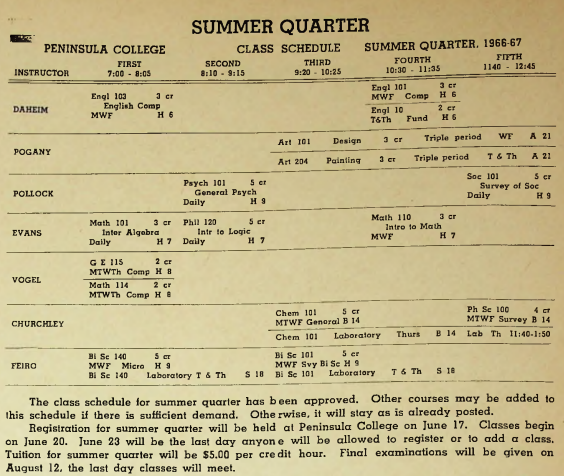
Good Conduct Asked at Dance
The Port Angeles Hi-Y Council has planned a series of
dances for the Port Angeles
area. These dances may be attended by persons who are
sophomores in high school
through sophomores in college.
In a letter written to the students of the college, Hi-Y Council President Pete Lieurance
stressed the importance of good
conduct at these dances. “We
will be operating on the basis
that students want to come to
the dances to dance,” Lieurance
said.
“We already realize that if
the students insist on coming to
the dances drunk, we will have
to fold. So we ask your help.
If you want to have a good
time at a dance, come to the
Hi-Y Council dances. If you
are going to drink, please stay
away,” Lieurance added.
Gift for Coach Quenette
as a special gift at the Awards
The Pirate basketball team
presented Coach Bill Quenette
with a tie and handkerchief set
Banquet.
Hi-Y Dances
The Hi-Y dances are scheduled for April 26, May 7, May
21, June 4, June 18, and July
16.
At each dance, refreshments
will be available. “The city
has established the grass lot
next to Erickson Playfield as a
parking lot,” Lieurance said,
concluding his letter.



